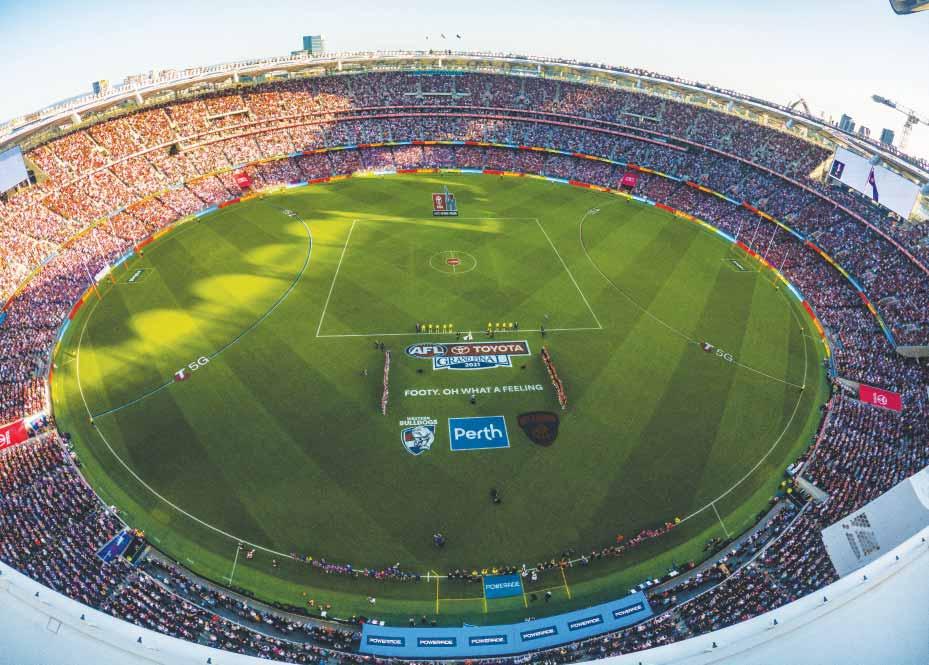
9 minute read
A Grand Final for the ages
Perth’s Optus Stadium hosted the 2021 AFL Grand Final. All images courtesy of VenuesLive.
Claire Krol explains how Perth’s Optus Stadium delivered the 2021 AFL Grand Final … in just 25 days
Advertisement
When AFL Chief Executive Gil McLachlan announced Optus Stadium would host the 2021 Toyota AFL Grand Final, the VenuesLive team in Perth reacted with a sense of excitement … and more than a hint of foreboding.
It was 31st August, and the Grand Final was scheduled in only 25 days’ time.
The permanent staff of less than 100 didn’t know it then, but in the next 25 days they would also deliver an AFL Semi-Final, an AFL Preliminary Final, a Bledisloe Cup rugby Test, an Open Training session for 10,000 fans and the Brownlow Medal event, followed a week later by the WA Football Finals.
In all, 256,000 fans would pass through the gates of Optus Stadium in a month, while the VenuesLive team also delivered a busy Meetings and Special Events (MASE) program off the pitch, highlighted by the lavish Brownlow Medal Dinner.
To understand the magnitude of this feat requires some perspective … in 2020 Brisbane had 55 days to prepare to host the Grand Final only. There was also the added complexity of delivering a series of events in the age of COVID, when nothing is straight forward.
For Optus Stadium and VenuesLive WA Chief Executive Mike McKenna (pictured right) and his team, being custodian of the AFL Grand Final carried significant responsibility.
McKenna explains “the AFL Grand Final is the highlight of the season and the pinnacle of a player’s career - we wanted to deliver an outstanding event, not just for those watching at the Stadium and from home, but for the players, the clubs, the AFL … everyone who had worked so hard to ensure the 2021 season could even be completed.
“As someone who had lived for several years in Victoria and worked for the Essendon Football Club, I knew only too well where this event was placed in the hearts and minds of Victorians. We wanted to put on a show that paid homage to the Grand Final legacy, with a uniquely Western Australian flavour.”
Behind The Scenes Once the announcement had been made, the VenuesLive team quickly swung into action, pulling together a Steering
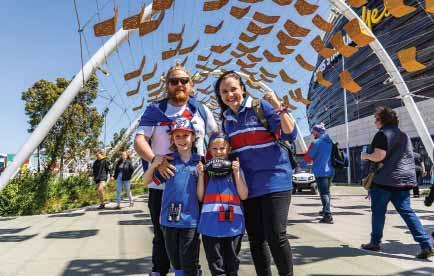




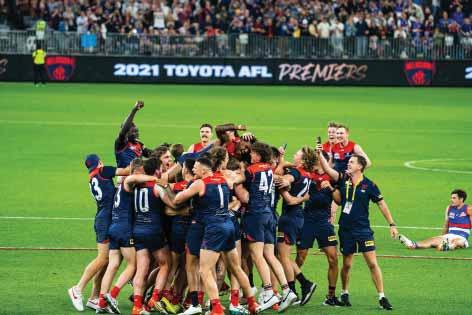
Melbourne players celebrate their historic win.
Committee that included representatives from VenuesWest, Tourism WA, the City of Perth, Western Australian Football Commission (WAFC), Western Australian Indigenous Tourism Operators Council and the AFL.
Meeting regularly, the Steering Committee’s role was to ensure Perth provided the best possible AFL Grand Final experience, delivered on commitments to the public and AFL, removed barriers for working groups and ensured a safe event for the fans and players. A series of Working Groups were created - across the operations, communications and marketing, broadcast and events spectrums.
In the days preceding the announcement, the AFL had quietly begun sending key AFL staff members on planes from Melbourne to Perth. The first would leave their hotel quarantine on 10th August, with another dozen left to return negative COVID tests and finally leave their hotels four to five days before the Grand Final.
McKenna recalls “this meant that many of our teams were ‘the feet on the ground’ for their AFL counterparts, while the latter were working remotely. Our team was able to provide invaluable local market expertise and strategic advice across a range of fronts - the Perth market is very, very different to what they had dealt with in Brisbane last year and in every other year at the MCG.”
Systems & Processes It was also during this time that teams across the Optus Stadium business began running desktop response exercises to test key IT and finance systems.
From an event planning perspective, the Grand Final was a lot like running sports and concert major events simultaneously, with double the demand on preparation activities and stakeholder management.
McKenna noted “we did a lot of work to test the robustness of systems and processes. In the IT area, we deployed additional Point of Sale terminals and backup systems across the venue in the lead-up to the day, as well as investing a significant period of time integrating Frontier’s entertainment equipment with our systems.
“The existing SafeWA COVID-19 signage around the venue was audited and boosted. The facilities team calculated the drain on the Western Power network from the event and contingencies were put in place.
“Conversations were had with government authorities to suspend voluntary burn-offs, commonplace in spring in Perth and often leaving the city covered in a thick layer of smoke. Assurances were given to ensure that wouldn’t happen on Grand Final Day.
“Everything that we could think of that could go wrong, we tried to put a plan in place to manage it. We have an experienced team here with great relationships, but we couldn’t have delivered such a successful event were it not for the support of state and local government, and our partners. This included a large public transport solution, which transported 80% of fans to the game.”
Projectco, along with their facilities management contractors BGIS and turf managers HG Turf, put in long hours to ensure the Stadium was in ship shape and the playing surface was looking a treat and ideal for the Stadium’s biggest ever event.
Dreamtime in Perth According to McKenna, hosting Dreamtime in Perth in early June was the moment that proved Perth could handle itself on the big stage.
He explained “on that occasion we had six days to pull off a huge event for a sell-out crowd, and facilitate and support the historic Long Walk from the WACA to the Stadium. Again, the Essendon Football Club had understandably only skeleton staff on the ground and none of the local networks we do, so we were really able to step in and step up to ensure the event was just as grand and meaningful as it is in Melbourne.
“Because of the success of Dreamtime, by the time we got to the Grand Final, we had already learned a lot about this kind of mega event - and the appetite of WA footy fans for the game.
“It also meant that the AFL had trust in us to deliver on their major events, especially one announced at such late notice.
“When the General Public tickets sold out in less than 10 minutes, none of us were surprised. Western Australians love footy and they know that watching the biggest sporting event on the calendar at The World’s Most Beautiful Stadium (the title given to Optus Stadium at the Prix Versailles 2019 Architecture Awards) was something not to be missed.”
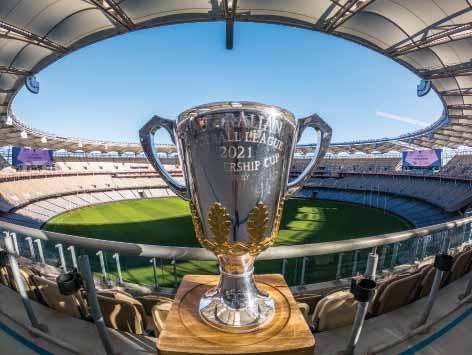
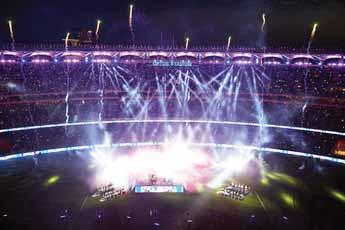
Optus Stadium lights up.
Premium Event Spaces & Five-Star Hospitality One of the reasons the AFL favoured the WA Grand Final bid was the ratio of premium event spaces available at Optus
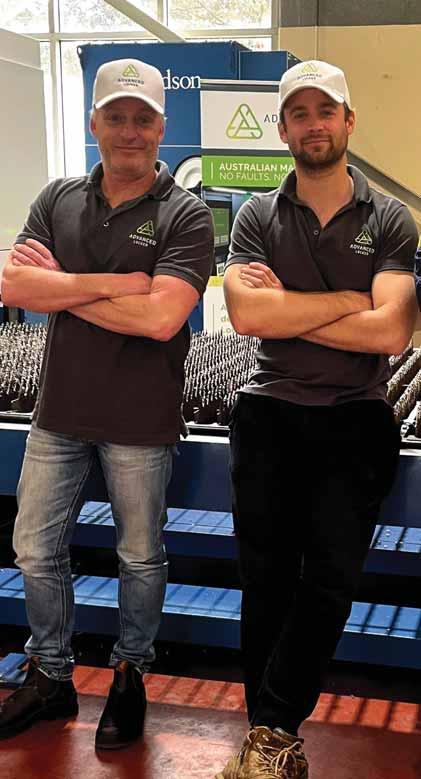

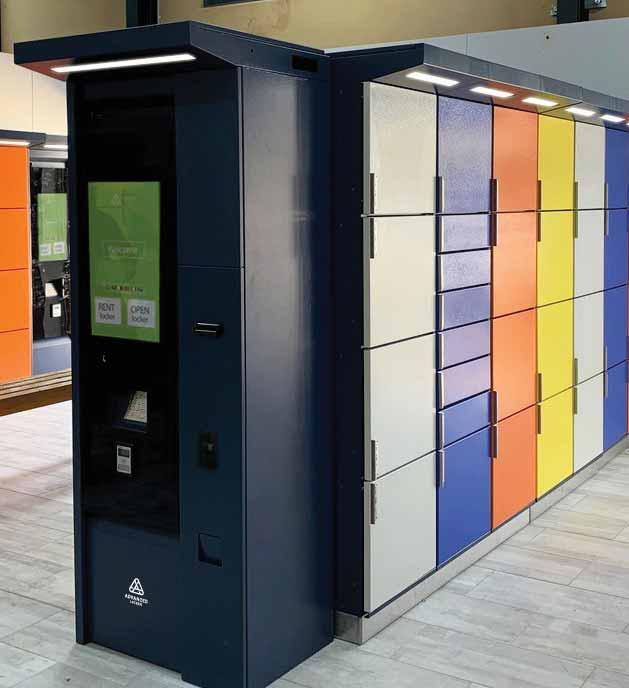
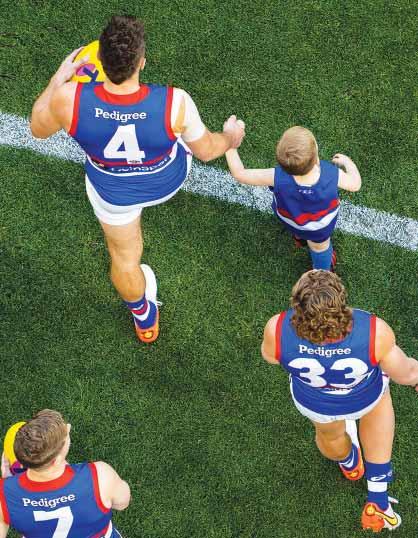
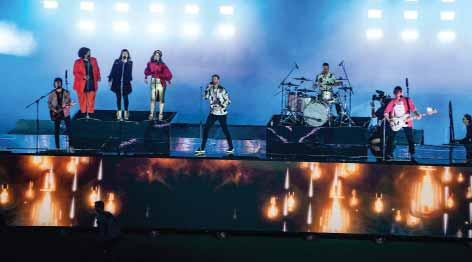
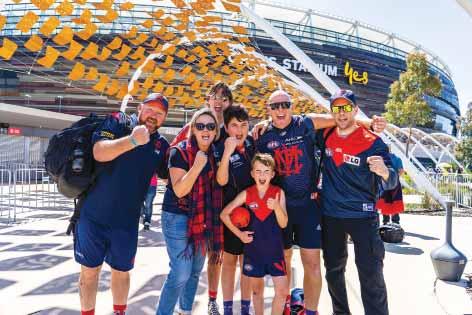
Stadium. The VenuesLive pitch included options to flip existing spaces and turn them into premium event spaces.
That ultimately meant there were some 9796 people accommodated in premium spaces on Grand Final Day - the highest number ever. About 2800 of those were in Private Suites.
There was also a uniquely West Australian problem to be faced: the Bureau of Meteorology was predicting 28 degrees on Grand Final Day, and many of the premium event spaces would be in full sun throughout the afternoon.
McKenna added “our teams came up with some really innovative solutions to ensure fans attending the game in those spaces had respite areas they could go to for shade and plenty of water.”
Western Australian producers came to the party, with a raft of suppliers delivering a feed like no other in Perth for spectators, whether they were in corporate boxes, function rooms or general admission seating. Fans dined out on scotch fillet from Marble Bar, crayfish from Cervantes, fresh produce from local market gardens and local freshly baked bread and pizzas.
The staging of the Grand Final at Optus Stadium translated into more business and more jobs for Western Australians. On the day, the Stadium served more than 160,000 cups of beer, 70,000 items of hot food in public outlets and the equivalent of 30,000 courses in premium hospitality meals.
The Staffing Challenge The unemployment rate in Western Australia is at an all-time low of 4.6 per cent. With no international students or travellers with working visas travelling into the state, finding and keeping staff is currently the most challenging part of running a major venue.
On a normal major event day, Optus Stadium employs some 1400 casual staff and for the Preliminary Final the venue employed 1900. For the Grand Final, an additional 600 were needed because of the length of the day and the volume of premium event spaces.
McKenna went on to say “we were very lucky that our corporate partners and local and state government organisations came to our aid … with staff coming from Gage Roads, Coles, the Town of Victoria Park, the City of Perth and RAC Arena and VenuesWest to help us out for the Preliminary Final and the Grand Final.
“Our VenuesLive permanent staff proved once again that given the challenge, they have the experience, skill and work ethic to deliver massive events, on the shortest of notice.”
The Vision The 2021 AFL Grand Final will be remembered as the year the Melbourne Demons Football Club broke a 57-year premiership drought with a 74-point win over the Western Bulldogs in a gripping decider.
But it will also be remembered for the stunning event held in front of 61,118 fans at Optus Stadium ... a stadium Western Australians are rightfully proud of.
Earlier this year, the VenuesLive team rewrote their vision: To be the most formidable, respected and trusted venue operators globally.
From an Optus Stadium point of view, the vision is to be recognised as Perth’s premier entertainment destination and to connect people through shared experiences and memorable moments.
It would be hard to argue that in 2021 the venue team hasn’t gone a long way to delivering on that vision.
McKenna concludes “by staging the biggest event on the Australian sporting calendar, with only 25 days to plan and execute, shows we can source and deliver the biggest events going around.
“We have demonstrated that Western Australia has the stadium, the fans, the staff and the suppliers to deliver the best events in the world.” Optus Stadium is operated by VenuesLive on behalf of the WA Government. Claire Krol is Head of Media, Communications and Government Relations at Optus Stadium.










